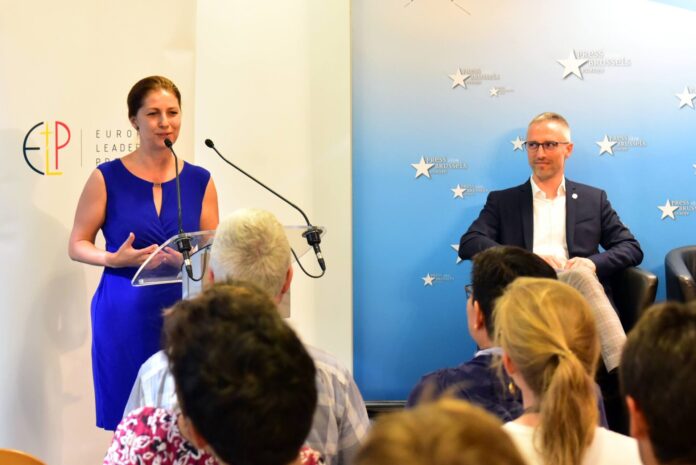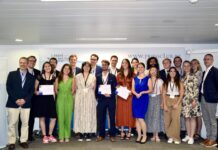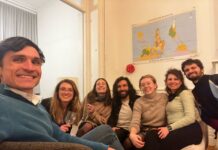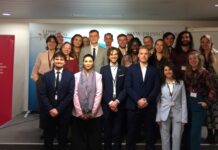Good evening, everyone,
I’m a bit nervous tonight. You see, previous ELP graduation speakers include the former President of the European Commission, Jose Manuel Barroso; Klaus Welle, the former secretary general of the European parliament; and the former editor-in-chief of Politico, Shéhérazade Semsar-de Boisséson. And chairmen of boards of directors, politicians and diplomats of the most senior ranks. As compared to them, I am literally, no one.
Out there, there are people, who are more successful, more powerful and more famous than me. It is with this knowledge that I composed my message to you tonight.
“Some believe it is only great power that can hold evil in check, but that is not what I have found. It is the small everyday deeds of ordinary folk that keep the darkness at bay. Small acts of kindness and love.” I didn’t come up with this statement, it’s a quote from Gandalf, the great wizard of the Lord of the Rings, but it best expresses the sentiment of what I think of the world today.
I’ll tell you what I mean. A fellow from one of the past cohorts once told me of her disappointment that the only job she could secure following her traineeship at the Commission was at the town hall in her hometown in rural Central Europe. She was to be an officer in the unit that looks after allocation of social housing. She told me that this was not what she had in mind she was going to do to make the world a better place. I asked if her new job meant that she was going to work to put a roof over a needy person’s head. She said yes. And I told her that every single roof she puts over the head of an individual or a family in need will significantly change their life for the better and therefore, by definition, make the world a better place.
It is the little things we do every day that make this world a bit better or a bit worse step by step. Quite recently, I was in Berlaymont with a relatively large group of representatives of various European enterprises. The usher, who picked us up to take us to the meeting room, gave us one look and you could see she was annoyed. Did not talk to us, told us in a stern voice to stand aside waiting for the lift, started angrily pushing the lift button. It was lunchtime and the building was very busy, so the lift took a long time. Another member of our group whispered to me that the lady was visibly irritated. I told him that by the name on her badge she was from my country or the country next door, and I would see if I could perhaps make her smile. I walked up to the usher and asked her in my language if I was correct that she was from my part of Europe. She nodded and relaxed a bit. Continuing the small talk, I remarked that if I was to work at Berlaymont, I would make sure to have my lunch early. Otherwise, the lifts are impossible. She smiled. We continued talking. By the time we reached the meeting room, I knew she was annoyed because she booked a room that was too small to accommodate us, as she was told a much smaller number of attendees. Her whole demeanor gradually changed. Instead of ‘some of you will have to stand, I suppose’ it was suddenly ‘let me count how many more chairs do we need to bring in’. She was calmer, we felt a lot more welcome and the overall amount of what is good in this world has shifted that little bit up.
I suppose we all feel the world is a bit of a mess nowadays. Wars, suffering, people pitched one against another everywhere you look. We have no one else to blame but ourselves. We also have no one else to fix it. Take one example. Online disinformation. The problem is not that people don’t know that the information they have just seen on their screen is fake or manipulated. The problem is that they do know it and they share it further because it validates their social or political identity. On any side of public discourse, lies have become acceptable if they serve their tribe. There is no regulation and no great leader that can stop disinformation, if we as individuals are happy to consume lies because they make us feel better about ourselves. There is a very old solution to this very modern problem – lying must be unacceptable. Do not lie, do not steal, do not kill anyone.
It’s not that difficult, only it is, because we must start with ourselves. Demanding virtue from others is not going to help. Doing the right thing, consistently, quietly, day after day, is a tedious task. A bit like a healthy diet, really. If you have good habits, time is your friend, and you will be fit. If you have bad habits, time is your enemy, and you will eventually become ill. The trick is not in being perfect, it’s being consistent. There is no effort without error and shortcoming. But that is not an excuse not to do what’s right. You want this world to be a kinder place? Be kind. Help others. Smile. Don’t judge. Don’t be snarky, don’t gossip. We all know what kind means. It is just about putting it into practice. When you fall short, don’t abandon your commitment. Try again the next day. You want society to be stronger, build it. Start a local walking or a book club. You want the environment to be better, plant a tree or join a beach clean-up. That no one else is doing it? Well, that is exactly the reason you should do it.
Do not expect anyone else but yourself to make the world a better place. If we as individuals allow ourselves to lie and steel, society will be broken and corrupt. If we turn around and pursue everyday common good, the society will be strong and healthy.
Back to that clumsy diet analogy – we all have learned how important is exercise and sensible lifestyle for us to live longer and healthier lives. Nobody cared for a healthy diet or running twenty-thirty years ago. And now we all do it. We are taking responsibility for our own health, and we will benefit. It is now time we learned to take personal responsibility for the state of our society. One deed at the time, slowly, consistently, we can change the world for the better. It’s hard work, but it’s worth it.
Dear graduates, I have no doubt that you will all walk incredible paths in your lives. When we had dinner together the other day, I saw a room full of confidence, competence and compassion. A room full of energy and desire to make this world a better place. And a room full of commitment to conduct your professional lives in line with your strong personal values.
I have faith in your success. One day, you will be directors, politicians and diplomats of the most senior ranks. But success comes slowly and is but short. If you are a politician, you’re lucky to be at the top for one electoral term. If you a very very lucky, it can be two terms. In any case, no more than ten years. You will have spent the other 70 or so years of your life being an ordinary person.
Spend every day of those years being a good ordinary person. You will represent workers’ rights; help alleviate humanitarian crises and work to decrease industrial emissions. Your legacy will be every single smile you bring, every hand you hold and every life you touch. You have the power to make a difference. Together we have the power to change the world.
Otilia Dhand
ELP Mentor





